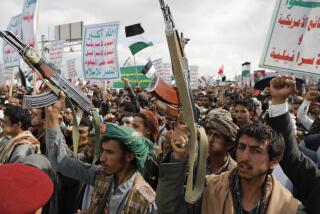300 U.N. Peacekeepers Held Hostage by Rebels
- Share via
UNITED NATIONS — Rebels in the West African nation of Sierra Leone are holding more than 300 U.N. troops and military observers hostage, officials said Friday, creating a grave crisis for the world body’s biggest peacekeeping operation.
There were reports that rebels of the Revolutionary United Front, or RUF, were using captured U.N. armored personnel carriers in military maneuvers. Gen. Vijay Kumar Jetley of India--commander of the U.N.’s 8,700-member force in the country, which was plagued during the 1990s by civil war--scrambled to consolidate troop positions so that no other soldiers would be detained.
At United Nations headquarters in New York, crisis teams prepared to meet through the weekend as anxiety was evident. U.N. officials described the situation as chaotic: Some peacekeepers reportedly had been disarmed, while others were detained but allowed to keep some of their weapons.
Officials feared that the rebels would use captured U.N. vehicles and weapons in an effort to overwhelm defenders in Freetown, the capital. The RUF leader, Foday Sankoh, reportedly was at his home, in the capital, surrounded by U.N. soldiers but in contact by satellite phone with the guerrillas.
The ripples of the rebellion threatened to imperil another peacekeeping mission planned for the continent--a force expected to be dispatched by late summer to Congo. U.N. officials feared that Western nations would resist serving in such operations, as occurred after the 1993 deaths of 18 U.S. soldiers and 24 Pakistanis serving in Somalia.
“The number of detentions of U.N. personnel by the RUF . . . continues to climb,” Fred Eckhard, the spokesman for U.N. Secretary-General Kofi Annan, said Friday in New York. “The latest estimate could be as high as 318.”
Eckhard said at least four U.N. soldiers from Kenya were killed and eight wounded. RUF forces disarmed and detained a contingent of 208 troops from Zambia who were on their way to the northern town of Makeni, he said.
In eastern Sierra Leone, a four-man U.N. helicopter crew and two passengers were freed Friday by the rebels after Liberian President Charles Taylor, a supporter of Sankoh, interceded on their behalf.
Annan, who returned from a visit to Paris when the dimensions of the crisis became clear, sought to mobilize the leaders of seven African nations--Liberia, Libya, Nigeria, Mali, Algeria, Burkina Faso and Togo--to put pressure on Sankoh to free the peacekeepers.
“The emphasis is not, at this point, to go to war against the RUF,” Eckhard said. “It is to find a political solution to a problem that is threatening the peace process at its core.”
In Washington, Secretary of State Madeleine Albright called the rebels’ behavior unacceptable. “The actions of Sankoh and the RUF need to be reversed immediately,” she said.
Only once before in the U.N.’s history had so many peacekeepers been seized. Bosnian Serbs took more than 370 U.N. troops hostage in May 1995 after their ammunition dumps were bombed by NATO planes. The last of those hostages were released the next month at the same time four Serbs held by the U.N. were returned to their units.
The Sierra Leone peacekeepers were deployed in December to oversee a peace agreement after eight years of war left the county in ruins. The accord, reached in July, called for power-sharing between the RUF and the Sierra Leone government. As part of the package, Sankoh was awarded a ministerial post.
Under the terms of the agreement, one of the tasks of the peacekeeping force was to supervise the disarming and disbanding of RUF rebels before elections, which are scheduled for next year.
Diplomats said they were uncertain why the rebels seized U.N. troops this week. In addition to speculation that the guerrillas had planned an assault on Freetown, some suggested that they were trying to scuttle the peace process so they could keep their armaments.
Eckhard said the U.N. had received no reports Friday of combat in the country. But helicopter surveillance revealed the rebels manning 13 armored personnel carriers bearing the U.N. logo that were taken Wednesday from a battalion of the Zambian peacekeepers.
U.N. personnel were on alert, but Eckhard said there were no plans to evacuate them from the country.
Annan’s diplomatic approach was part of a three-pronged effort to resolve the crisis. He also appealed for nations to send troops to reinforce the beleaguered peacekeepers. And he lobbied for the creation of a rapid-reaction force drawn from the armies of U.N. members to respond to such crises.
Great Britain planned to dispatch a team of military experts to Freetown to help the U.N. assess the technical support needed to enhance the mission’s effectiveness. A British military officer is among the hostages, a Foreign Office spokesman said.
The Clinton administration has made it clear that no U.S. soldiers will be dispatched as peacekeepers in Sierra Leone, but said it would consider sending logistical support, including aircraft.
Eckhard said the U.N. troops had authority to use force to protect themselves and civilians who were in danger. But diplomats said the peacekeepers lacked the personnel and armaments for sustained combat against an estimated 45,000 heavily armed rebels.
More to Read
Sign up for Essential California
The most important California stories and recommendations in your inbox every morning.
You may occasionally receive promotional content from the Los Angeles Times.













